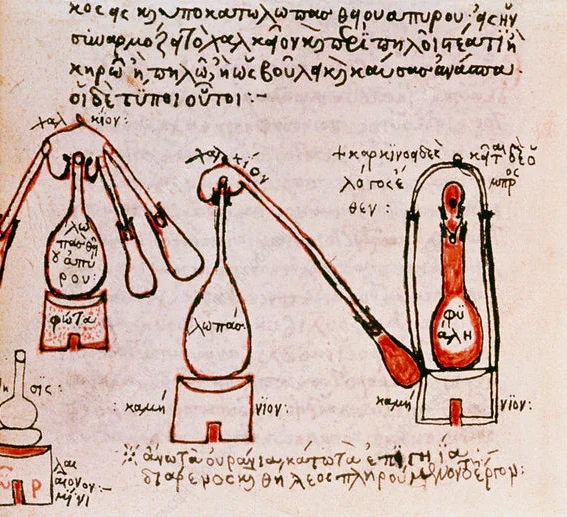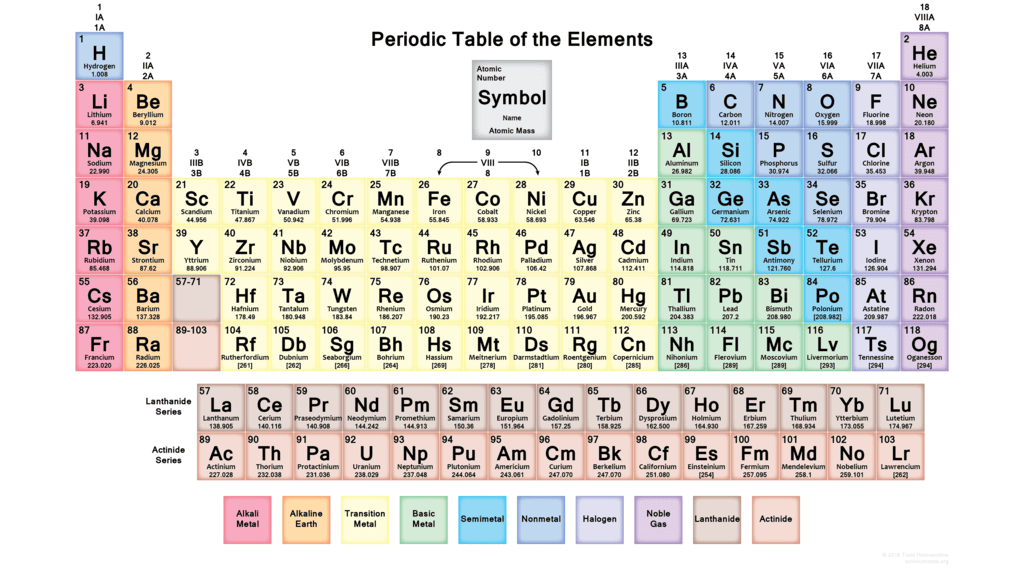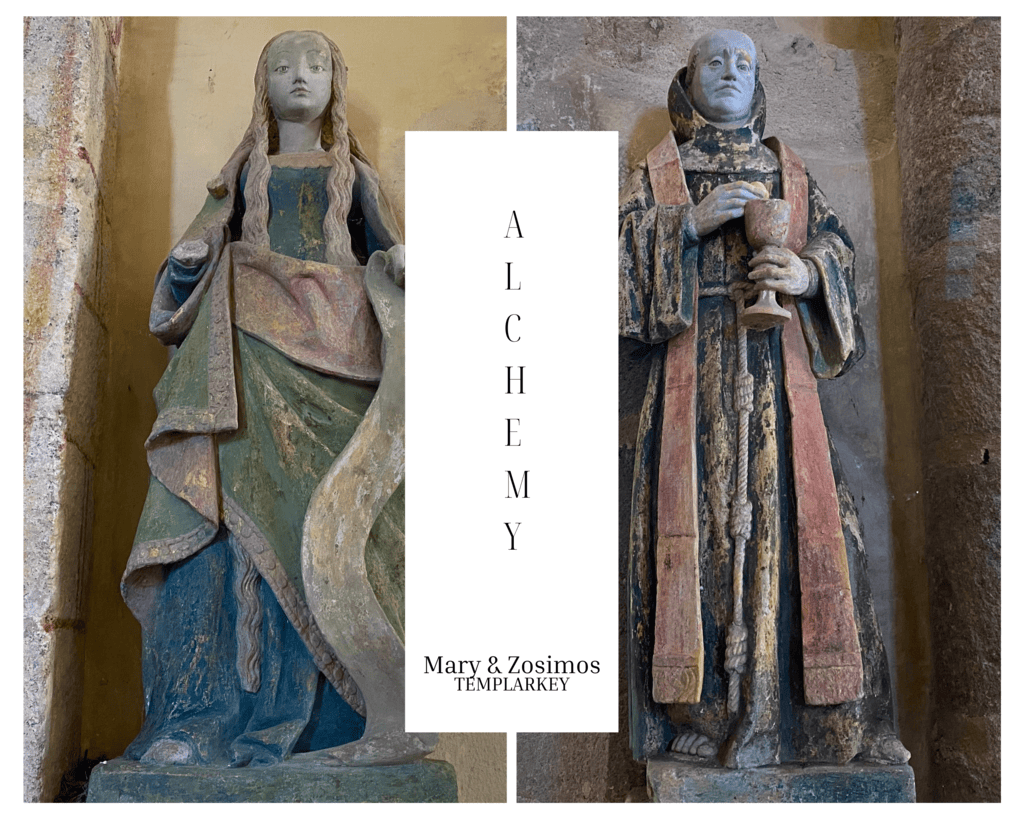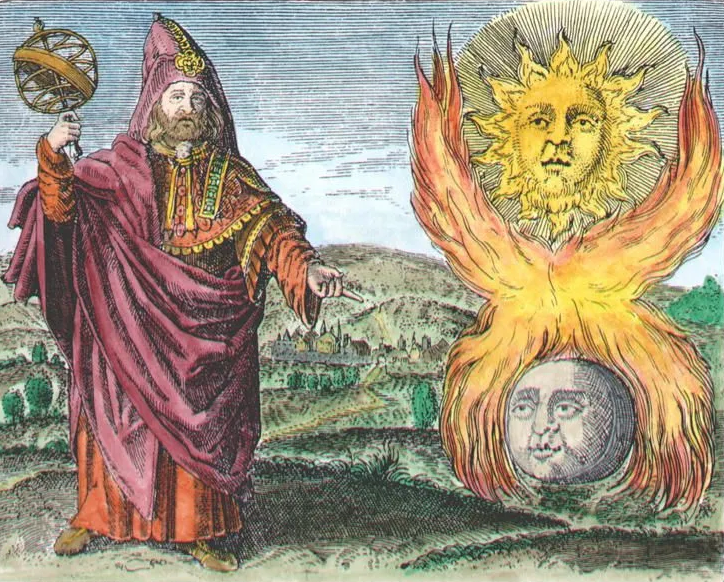History of Chemistry: Alchemy, the Ancient Greeks and the Alchemist Hermes Trismegistus
The work of Greek alchemists contributed immensely to the field of alchemy, which was a pre-scientific form of chemistry. Within this article, Alchemy in Ancient Greece and the Alchemist Hermes Trismegistus, we will discover topics such as the Emerald Tablet of Hermes and The Hemetica, the foundations of Alchemy and the history of chemistry.

The roots of alchemy in ancient Greece run deep, with early practices influenced by Greek mythology and philosophy. Key figures played a crucial role in the development of alchemical processes, setting the stage for the enduring impact of these practices on later traditions in the Western world.
In ancient Greece, alchemy was intertwined with the philosophical ideas that shaped the culture of the time. The concept of the four elements (earth, air, fire, water) held significant importance in alchemical processes, as did the pursuit of elusive substances like the Philosopher’s Stone and the Elixir of Life. These ideas were deeply connected to Greek philosophical schools such as Platonism and Stoicism, laying a foundation for centuries of alchemical exploration.
Early practitioners of alchemy in ancient Greece utilized laboratory equipment and apparatus to conduct experiments aimed at transmutation and creating new substances. Techniques such as distillation were vital to these processes, as alchemists sought to unlock the secrets of transformation and creation. The spiritual and mystical aspects of alchemy were also woven into its practices, reflecting connections to ancient Greek religious beliefs and mythology.
The Alchemist Hermes Trismegistus
Hermes Trismegistus was a legendary figure from the Hellenistic period, believed to be a combination of the Greek god Hermes and the Egyptian god Thoth. Hermes Trismegistus was viewed as an ancient philosopher, believed by some as a deity of knowledge and wisdom. He is known for his work in the field of alchemy, particularly the creation of the Philosopher’s Stone. His teachings on spiritual alchemy and the pursuit of enlightenment continue to influence esoteric and mystical traditions.
The Hemetica
The Hermetica is a collection of ancient texts containing philosophical and scientific inquiries into the natural world and the Divine World. These texts are believed to have been written by the legendary figure Hermes Trismegistus, who was revered as a master of wisdom and a keeper of esoteric knowledge. The oldest were written in Greek and later translated into Arabic and Latin. During the Middle Ages, Hermetic texts in both Arabic and Latin were extensively copied. One of the most famous examples is the Emerald Tablet. The Hermetica covers a wide range of topics, including alchemy, astrology, theology, cosmology, and spiritual development. Its teachings have influenced various religious and philosophical traditions throughout history and continue to inspire seekers of knowledge and understanding today.
Emerald Tablet of Hermes
The mysterious Emerald Tablet of Hermes, also known as the Smaragdine Tablet (the Tabula Smaragdina), is a concise and enigmatic Hermetic text that made its first appearance in the Alchemical Libraries of Europe during the 12th Century. Eric John Holmyard, the British science historian, suggested that this Tablet may be one of the oldest alchemical works we have that survive. It’s been a topic of fascination and intrigue for centuries, with many people trying to unravel its secrets and hidden meanings.

The Hermetic traditions influence on early Christianity
The Hermetic traditions, which originated in ancient Egypt, were later absorbed by the Greeks and Romans; these traditions significantly influenced early Christianity. These traditions emphasized the pursuit of spiritual knowledge, the importance of inner transformation, and the concept of unity between the divine and the material world. Many scholars believe these ideas were incorporated into Christian thought through the works of early Christian writers such as Clement of Alexandria and Origen, who were familiar with Hermetic philosophy. The influence of Hermeticism on Christian theology can be seen in doctrines such as the concept of the Logos, which was central to both traditions, as well as in the emphasis on spiritual growth and the quest for mystical experiences.
The philosophical foundations of Alchemy and the history of chemistry
Alchemy in Ancient Greece was deeply rooted in Greek mythology and philosophy, laying the groundwork for the development of early alchemical practices. The concept of the four elements (earth, air, fire, water) played a significant role in alchemy during this time, with alchemists believing that by manipulating these elements, they could transmute base metals into gold and create the Elixir of Life. This belief was influenced by Greek philosophical ideas such as the search for the Philosopher’s Stone, an object believed to have the power to transform any metal into gold and grant immortality.
Furthermore, the relationship between alchemy and Greek philosophical schools, such as Platonism and Stoicism, shaped the philosophical foundations of ancient Greek alchemy. Alchemists were inspired by the teachings of Plato and other philosophers in their pursuit of knowledge and understanding of natural phenomena. The influence of these philosophical ideas on early alchemy laid the groundwork for the mystical and spiritual aspects often associated with alchemical practices.
The significance of alchemy in ancient Greece can also be seen in its connection to ancient Greek mythology. Alchemical processes were often associated with Greek myths and deities, with symbols and allegories from Greek mythology being used in alchemical texts and illustrations.
These symbolic representations reflected the spiritual and mystical aspects of alchemy, showing its deep connection to ancient Greek religious beliefs. The blending of mythology, philosophy, and practical experimentation set the stage for the enduring legacy of alchemy in ancient Greece and its impact on later traditions in the Western world.
| Concept | Significance |
|---|---|
| The Four Elements | Played a key role in early alchemical processes |
| Greek Philosophical Schools | Influenced the development of philosophical ideas in ancient Greek alchemy |
| Alchemy and Mythology | Used symbols and allegories from Greek mythology in alchemical texts |
Egyptian innovation? Practices Greeks may have used in Antiquity
The practice and history of alchemy in Egypt and ancient Greece involved a variety of techniques and processes aimed at transforming or creating new substances. Early alchemists conducted experiments using basic laboratory equipment and apparatus to explore the properties of various materials, with the ultimate goal of achieving transmutation. The process of distillation was particularly important in alchemical experiments, as it allowed for the separation and purification of substances, as well as the extraction of essential components from natural sources.
Some common alchemical techniques and practices used in ancient Greece included:
- Distillation: Alchemists used this process to purify and concentrate substances, such as extracting essential oils from plants or separating components of a mixture based on differences in their boiling points.
- Calcination: This involves heating a substance to high temperatures in order to remove impurities or transform it into a more refined form.
- Sublimation: Alchemists used sublimation to convert a solid directly into vapour, which could then be condensed back into a solid form with altered properties.
These techniques were often accompanied by elaborate rituals and symbolic language inspired by Greek mythology and philosophy. In their pursuit of knowledge and transformation, early alchemists sought to uncover the secrets of nature and unlock the potential for creating powerful elixirs or discovering the Philosopher’s Stone.
The experimentation and methodologies utilized by ancient Greek alchemists laid the groundwork for later developments in chemistry, influencing the way scientific inquiry and discovery were approached. While modern chemistry has moved beyond the speculative nature of ancient alchemy, its historical impact remains undeniable. Ancient Greek alchemy continues to fascinate scholars and historians alike, providing valuable insight into the origins of scientific thought and exploration.
The Influence of Ancient Greek Mythology on Alchemical Symbolism
The association of alchemical processes with Greek myths and deities was a central feature of early alchemy in ancient Greece. Alchemists drew heavily from the rich tapestry of Greek mythology, incorporating symbols, allegories, and metaphors from these ancient tales into their work. Alchemy is often associated with magicians attempting to turn lead into gold. However, it was the study of chemistry from the 3rd Century BC until the end of the 17th Century.
The word alchemy has its roots in the Arabian phrase al-kimia, which the Egyptians used to describe the preparation of the Stone or Elixir. The term kimia is derived from the Coptic word khem, which refers to the fertile black soil of the Nile Delta. In an esoteric and hieroglyphic sense, alchemy refers to the mysterious nature of the primordial or ‘First Matter’ (the Khem).
The concept of alchemy was first introduced by Aristotle, who believed that all forms of matter comprised four basic elements – earth, air, fire, and water. He hypothesized that these elements could be transformed or transmuted through the application of heat and cold or dampness and dryness.
Aristotle’s ideas were further developed by the Greeks who came after him and later by Arab scientists. At times, alchemy became entangled in metaphysics. In Roman times, the practical Romans had no interest in it whatsoever. In medieval times, as civilization expanded towards Europe’s north, alchemy almost completely faded away until the 13th and 14th centuries when scholars began to re-examine the ancient Greek and Arabic texts.
Use of symbols and allegories
Alchemical texts and illustrations from ancient Greece are replete with references to mythological figures such as Hermes, the god associated with alchemy, due to his role as a messenger between the realms of gods and mortals. Likewise, the story of Jason and the Argonauts’ quest for the Golden Fleece was frequently invoked as a metaphor for the alchemical quest. These symbols and allegories served as a means for early alchemists to convey their ideas and teachings in a cryptic manner, accessible only to those initiated into the mysteries of alchemy.
Spiritual and mystical aspects
The spiritual and mystical aspects of alchemy in ancient Greece were deeply intertwined with its connection to ancient Greek religious beliefs. Alchemists saw their work not just as a scientific endeavour but also as a spiritual journey towards enlightenment. The imagery used in alchemical texts often evoked themes of transformation, regeneration, and transcendence – all concepts that resonated deeply with Greek religious traditions.
Alchemy and Medicine in Ancient Greece
The exploration of alchemy in ancient Greece extends beyond its mystical and philosophical aspects, as it also played a significant role in the development of early medicine. Alchemists in ancient Greece were pioneers in the exploration of natural substances and their potential medicinal properties. The keyword alchemy in ancient Greece was influential as this period marked the blending of alchemical practices with the study of medical treatments.
One of the key contributions of alchemy to medicine in ancient Greece was the development of herbal remedies and medicinal treatments. Alchemists conducted experiments to extract essential oils and compounds from plants, seeking to harness their healing properties. The knowledge gained from these experiments laid the groundwork for the use of natural substances in medical practice, laying a foundation for what would later become pharmacology. Furthermore, blending alchemical and medical knowledge in ancient Greece led to advancements in medical techniques and procedures.
Alchemists’ understanding of laboratory equipment and chemical processes allowed for the refinement and creation of new medicinal substances, contributing to the expansion of medical treatments available during that time. Overall, merging alchemy with medicine laid a crucial groundwork for modern pharmacological practices. The legacy of early Greek alchemical pursuits continues to impact contemporary medicine, demonstrating how ancient alchemical practices have shaped our understanding and approach towards healthcare.
The Christian Chemist Zosimos and Proto-Science
Zosimus of Panopolis (in Latin Zosimus Alchemista, i.e. Zosimus the Alchemist) was a 3rd-century Graeco-Egyptian alchemist whose work combined technical and Gnostic elements. He made many advances in Egyptian alchemy and authored the oldest known books on alchemy, which he named Cheirokmeta, deriving from the Greek word meaning ‘things made by hand’. Supposedly, the first written account of the Philosopher’s Stone was found in Cheirokmeta. Zosimos used the image of a mixing bowl, known as Krater in Hermeticism, which symbolized the divine mind. Per the Hermetic belief, the initiate was purified and baptized while ascending through the heavens in a visionary state. This journey ultimately leads them into the transcendent realms.

Key Phrases Mercury, Antimony, Sulfur and Arsenic used in Alchemy

Mercury
Mercury is a highly toxic chemical element with the symbol Hg on the periodic table and atomic number 80. It is a silvery-white metal known for its unique properties, such as high density, low melting point, and excellent conductivity. Mercury has been used in various applications in common use throughout history, including thermometers, barometers, dental fillings, and even in early forms of fluorescent lighting. The element is also known as quicksilver due to its liquid form at room temperature.
The name ‘mercury’ derives from the Roman god Mercury, known for his speed and mobility. The element was formerly known as hydrargyrum, from the Greek words hydor (water) and argyros (silver). Today, the use of mercury is highly regulated due to its toxic effects on the environment and human health.
Antimony
Antimony is a chemical element denoted by the symbol Sb and atomic number 51. It is a shiny grey metalloid commonly found in nature as the sulfide mineral stibnite. However, exposure to antimony and its compounds can pose serious health hazards, such as damaging the eyes, skin, lungs, heart, and stomach. In alchemy, it symbolizes the animal nature or wild spirit of man and nature, and it was often symbolized by the wolf.
Sulfur
Sulfur is a chemical element with the atomic number 16 symbol S in the Periodic Table. It is an abundant, nonmetallic element commonly used in various chemical reactions and industrial processes. In science, sulfur plays a vital role in multiple fields of study, including geology, biology, chemistry, and physics. It is known for its unique properties, such as its ability to form compounds with many other elements, its high melting and boiling points, and its yellow colour.
In alchemy, sulfur is considered one of the three basic elements, along with mercury and salt. It is often associated with fire and is believed to represent the soul or spirit. Alchemists used various alchemical terms to describe sulfur; they believed that by combining sulfur with other elements and performing specific alchemical processes, they could transform base metals into gold or create an elixir of life.
The Lion in Dual Form
The lion appears in dual form as lion and lioness, or he is said to be Mercurius duplex. The two lions are sometimes identified with the red and white sulphur. The illustrations show a furious battle between the wingless lion (red sulphur) and the winged lioness (white sulphur). The two lions are prefigurations of the royal pair; hence, they wear crowns. Evidently, at this stage, there is still a good deal of bickering between them, and this is precisely what the fiery lion is intended to express: the passionate emotionality that precedes the recognition of unconscious contents. C. G. JUNG: Mysterium Coniunctionis.
Arsenic
Arsenic is a metalloid element that belongs to the periodic table and has the symbol As, with an atomic number of 33. This versatile element has been widely studied in various scientific fields, including geology, biology, chemistry, and physics. Arsenic is known for its intriguing properties, such as its ability to form stable compounds with many elements, its toxicity, and its semi-metallic nature. From serving as a semiconductor in electronic devices to being used as a preservative in wood, arsenic has numerous applications in industries and research areas. Despite its usefulness, arsenic can also pose significant health risks, and thus, its effects on the environment and human health continue to be a subject of scientific investigation.
In Alchemy, arsenic is often portrayed by the image of a swan or sometimes multiple swans; this is because arsenic, as a metalloid element, has the unique ability to change its physical appearance from one form to another, similar to the transformation of a cygnet into a swan. The symbol representing arsenic is a pair of triangles overlapping, forming a distinctive shape. Arsenic is found in several ancient alchemical recipes: the Physika et Mystika (the earliest known text on alchemy) recommends that arsenic is used to whiten copper.
Conclusion: Legacy and Impact of Alchemy in Ancient Greece
In conclusion, the early forms of alchemy in ancient Greece have left a lasting legacy and impact on the development of Western alchemical traditions. The influence of Greek mythology and philosophy and the pioneering work of key figures in the field paved the way for alchemy’s enduring significance. The concept of the four elements and the pursuit of the Philosopher’s Stone and Elixir of Life were deeply rooted in ancient Greek philosophical foundations such as Platonism and Stoicism, shaping the direction of alchemical practices for centuries to come.
Furthermore, alchemy’s connection to ancient Greek mythology and religious beliefs is evident in the use of symbols and allegories from Greek myths in alchemical texts and illustrations. This association added a spiritual and mystical dimension to early alchemy, contributing to its enduring fascination and allure. Additionally, the blending of alchemical knowledge with medical practices in ancient Greece laid the groundwork for modern medicine, highlighting the practical applications of alchemy beyond its symbolic or spiritual aspects.
Overall, the enduring influence of early alchemy in ancient Greece on later Western alchemical traditions cannot be overstated. It paved the way for modern chemistry and continues to captivate scholars and historians due to its historical significance. The exploration of transmutation techniques, laboratory processes, and medicinal applications created an enduring legacy that continues to shape our understanding of science, philosophy, and spirituality today. The search for transformation that was central to alchemy in ancient Greece has undeniably resonated throughout history and remains an area of continued interest and study.
Frequently Asked Questions

What is Alchemy in Ancient Greek?
Alchemy in Ancient Greece refers to the practices and beliefs related to the transformation of base metals into gold, the discovery of a universal panacea, and the quest for immortality.
Who is the Greek God of Alchemy?
The Greek god of alchemy is Hermes Trismegistus, also known as Hermes Thrice-Greatest. He is considered the founder and patron of alchemy, revered for his wisdom and knowledge.
What are the elements of Greek Alchemy?
The elements of Greek alchemy include philosophical principles, symbolism, and mystical interpretations. It also involves understanding natural elements such as earth, air, fire, and water.
What does Alchemist Mean in Greek?
It is believed that the term ‘Chemeia’ has its roots in the Greek language, specifically from the word chemi, which translates to black. The origin of this word can be attributed to three potential reasons. One of them being the dark-colored soil found in certain regions, which could have been a significant factor in the naming of the term. Alchemy is from the Greek khemeioa, either from Khemia, a name for Egypt meaning ‘land of black earth’, or the Greek khymatos. The Greek word khumos, meaning fluid, has been suggested as an alternate origin for the word Alchemy.

Did Greeks use Alchemy?
Yes, Greeks did use alchemy. They were known for their pursuit of transmutation, potion-making, and the search for the philosopher’s stone. Alchemy was a significant part of their intellectual and spiritual endeavours in ancient times. The most famous persons involved in alchemy in ancient times were Mary, also known as the Jewess and Mary the Prophetess and Zosimos.
